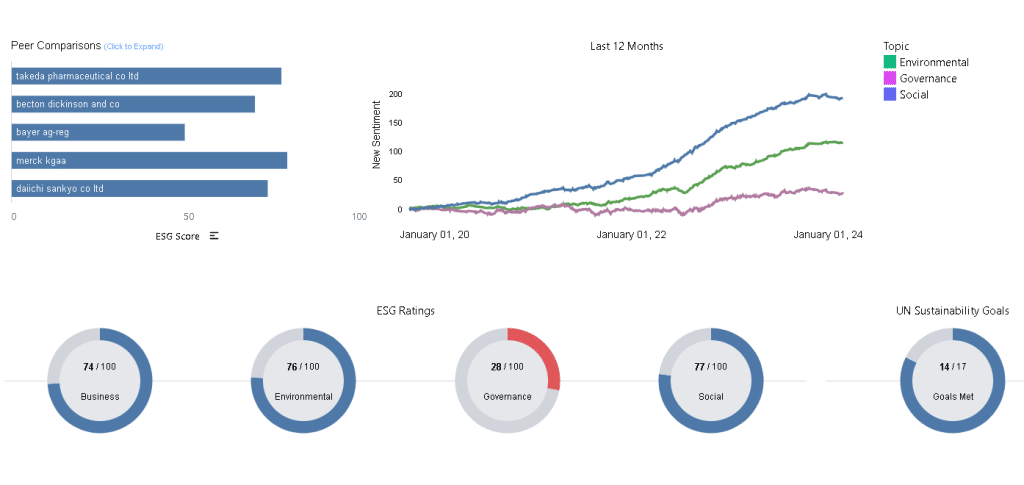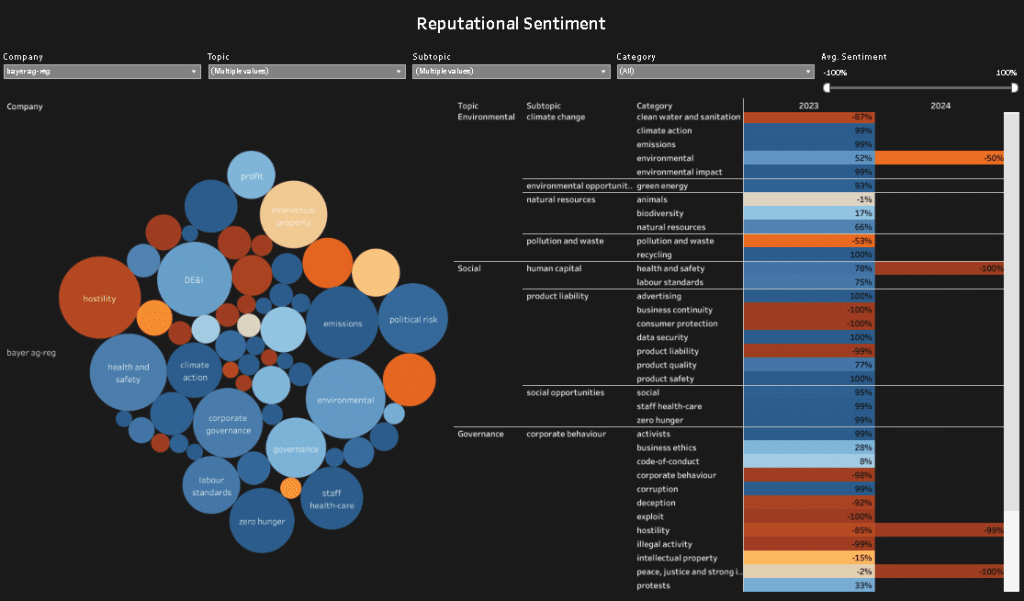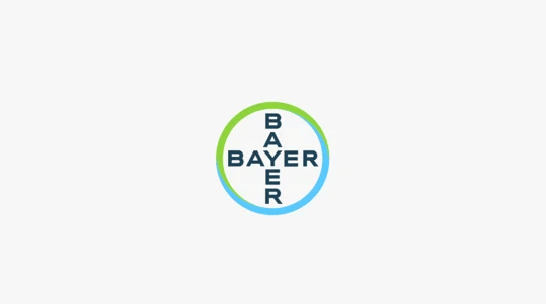Bayer, a global leader in pharmaceuticals and life sciences, has long recognized the importance of sustainable business practices. As a company committed to making a positive impact on society and the environment, Bayer has implemented a range of initiatives that prioritize sustainability. These efforts not only contribute to a healthier planet but also drive innovation and foster long-term growth. In this article, I will delve into the various sustainability initiatives undertaken by Bayer and explore how they shape the company’s approach to business.
Bayer’s ESG Score
Our Bayer ESG score – based on news sentiment analysis – demonstrates the company’s commitment to sustainability. According to our data Bayer scores are 76 in environmental factors, 77 in social factors and 28 in governance at time of writing. The company’s ESG score is a testament to its commitment to responsible business practices and its ability to create sustainable value for all stakeholders. Let’s take a look at their sustainability progress and where else there is room for improvement.


The environmental impact of Bayer’s operations
Bayer understands that its operations can have a significant impact on the environment. To mitigate this impact, the company has implemented measures to reduce its carbon footprint, conserve natural resources, and minimize waste. Through innovative technologies and processes, Bayer has made substantial progress in reducing greenhouse gas emissions and water consumption. Additionally, the company has implemented waste management programs that aim to minimize waste generation and promote recycling.
However, there is still room for improvement in several areas of Bayer’s environmental strategy. Despite the strides made in reducing emissions and conserving resources, the global scale of Bayer’s operations means that its overall environmental impact remains substantial. Future efforts could focus on further reducing dependency on non-renewable energy sources and exploring more sustainable alternatives across all facets of its operations. Additionally, Bayer could enhance its commitment to biodiversity by developing and implementing more robust strategies to protect ecosystems affected by its agricultural products and manufacturing processes.
Further investing in circular economy principles could also offer Bayer an opportunity to reduce its environmental footprint further. By designing products and processes that are regenerative by nature, Bayer can contribute to a more sustainable future where resources are reused and recycled, minimising waste and reducing the demand for raw materials.
Engagement with stakeholders, including local communities, environmental organisations, and regulatory bodies, is crucial for identifying areas for improvement and developing more effective sustainability strategies. Transparent reporting on environmental goals, progress, and challenges will also enhance Bayer’s credibility and show its commitment to environmental stewardship.
Bayer’s commitment to corporate social responsibility
Bayer’s CSR efforts are multifaceted, aiming not only to improve access to innovative medicines and treatments but also to educate and empower communities. The company has been involved in various partnerships and programs designed to combat diseases, improve maternal and child health, and support healthcare systems in developing countries. By working closely with governments, NGOs, and other stakeholders, Bayer strives to make a lasting impact on global health outcomes.
Education is another pillar of Bayer’s CSR strategy, with the company investing in programs that support STEM education from primary schools to universities. Recognizing the importance of nurturing the next generation of scientists, engineers, and innovators, Bayer’s educational initiatives aim to inspire and equip young people with the skills they need to tackle future challenges. Through scholarships, internships, and educational partnerships, Bayer is helping to bridge the gap between academic learning and practical application in the sciences.
In the agricultural sector, Bayer’s commitment to CSR manifests in its efforts to promote sustainable farming practices and enhance food security. The company acknowledges the critical challenge of feeding a growing global population while minimizing agriculture’s environmental footprint. To this end, Bayer invests in research and development of crop solutions that increase yield and resilience while using fewer natural resources. Furthermore, Bayer engages in dialogue with farmers, agronomists, and food industry stakeholders to share knowledge and technologies that can lead to more sustainable agricultural practices.
Bayer’s CSR initiatives also extend to its philanthropic efforts, which include donations, volunteer programs, and support for community projects. The company encourages its employees to engage in volunteerism, providing them with opportunities to contribute to their communities and make a positive social impact. Through its support for charitable organizations and community-based projects, Bayer aims to address immediate needs while also working towards long-term social development.
Governance practices at Bayer
Bayer’s governance score is influenced by a range of factors that are pivotal in assessing a company’s corporate governance practices. The company has encountered notable legal and regulatory challenges, particularly highlighted by its environmental issues and the safety concerns surrounding some of its products. Legal battles, such as those following the acquisition of Monsanto and the controversies over glyphosate, the active ingredient in Roundup, spotlight significant risks in Bayer’s management practices and product safety compliance. These challenges not only raise questions about the company’s risk management capabilities but also affect stakeholders’ perceptions, thereby impacting its governance score.
Despite Bayer’s concerted efforts to boost transparency and accountability, the shadow of past criticisms and ethical scandals looms large over its governance rating. The effectiveness of the company’s board of directors, encompassing aspects like diversity, independence, and decision-making processes, is crucial in governance evaluations. Any perceived shortcomings in board composition, conflicts of interest, or transparency in addressing past or ongoing controversies can negatively influence perceptions of Bayer’s governance quality. Additionally, ethical conduct and adherence to compliance play a significant role; past instances of marketing fraud have had a lasting impact, underlining the importance of upholding ethical standards and enforcing compliance to rebuild trust.
Risk management is another vital component of corporate governance, with effective identification, assessment, and mitigation of risks being key to a company’s stability and integrity. Bayer’s frequent legal, environmental, and health and safety challenges may lead to perceptions of insufficient risk management. Moreover, governance perceptions can be adversely affected by issues related to executive compensation, shareholder engagement, and the safeguarding of shareholder rights. Practices perceived as misaligned with long-term shareholder value or insufficient in considering shareholder interests can detrimentally affect governance scores.
In essence, Bayer’s journey to improving its governance score entails a comprehensive approach to addressing these multifaceted challenges. The company’s dedication to enhancing governance practices, increasing transparency, and fostering constructive stakeholder engagement marks positive steps forward. However, given the complexity and magnitude of Bayer’s challenges, noticeable improvements in governance scores may require time to manifest. Bayer’s ongoing efforts to navigate these issues reflect its commitment to upholding high standards of governance, crucial for rebuilding stakeholder trust and ensuring long-term sustainability.
Is Bayer an ethical company?
The question of whether Bayer is an ethical company involves evaluating various aspects of its business practices, including its environmental impact, product safety, corporate governance, social responsibility, and how it addresses ethical concerns. Bayer, a global enterprise with core competencies in the Life Science fields of health care and agriculture, has faced both praise and criticism regarding its ethical standing.
On one hand, Bayer has been recognized for its efforts in sustainability, innovation in healthcare and agriculture, and contributions to social causes. The company often highlights its commitments to environmental protection, sustainable development, and corporate social responsibility. Bayer has initiatives aimed at improving access to healthcare, supporting agricultural development, and reducing its environmental footprint.
On the other hand, Bayer has faced significant ethical controversies, most notably related to product safety and legal issues. For instance, Bayer’s acquisition of Monsanto brought with it ongoing litigation related to glyphosate, the active ingredient in Roundup, which has been the subject of numerous lawsuits alleging it causes cancer. These legal challenges have raised questions about the company’s commitment to product safety and transparency.
Bayer has faced criticism over the environmental impact of its products, including concerns over the impact of its pesticides on biodiversity and pollinator populations. The company’s history also includes ethical scrutiny related to its pharmaceutical products and practices. Evaluating Bayer’s ethical standing requires balancing these positive contributions against the controversies and criticisms it faces. It’s essential to consider current reports, the company’s responses to ethical challenges, and third-party assessments from organizations that evaluate corporate ethics and sustainability.
Bayer’s focus on innovation and sustainability
Innovation is at the heart of Bayer’s business strategy, and sustainability is a key driver of its innovation efforts. The company recognizes that sustainable solutions are essential to addressing global challenges and meeting the evolving needs of society. Bayer invests heavily in research and development to develop innovative products and technologies that promote sustainability.
In the healthcare sector, Bayer’s innovative efforts are geared towards creating treatments and digital health technologies that enhance patient care, focusing on safety, efficacy, and affordability to ensure wide accessibility. Similarly, in agriculture, Bayer promotes sustainable farming practices through the development of products and digital tools that help farmers increase productivity while conserving natural resources. The company’s investment in precision agriculture, for example, showcases its commitment to optimizing farming practices, reducing waste, and supporting sustainable inputs. Through these efforts, Bayer not only positions itself as a leader in sustainable development but also exemplifies how corporations can drive significant positive change, contributing to a more sustainable and equitable global economy.
Community engagement and social commitments
Bayer recognizes the importance of engaging with communities and addressing their specific needs. The company actively engages in community development initiatives and partners with local organizations to drive positive change, reflecting in it’s solid score in social factors. Bayer’s social commitments span a wide range of areas, including education, healthcare, and environmental conservation.
In education, Bayer has established numerous scholarship programs aimed at supporting students in STEM. These initiatives are designed to nurture the next generation of leaders and innovators, providing them with the tools and opportunities needed to excel in their academic and professional pursuits. Additionally, Bayer’s involvement in healthcare access programs demonstrates its commitment to improving health outcomes for underserved populations. By providing essential medicines, funding medical research, and supporting health education initiatives, Bayer plays a pivotal role in enhancing healthcare accessibility and quality worldwide.
Environmental conservation is another key area of Bayer’s community engagement efforts. Recognizing the importance of a healthy environment for overall community well-being, Bayer has implemented projects aimed at protecting natural habitats and promoting biodiversity. From reforestation efforts to water conservation projects, Bayer’s environmental stewardship initiatives reflect a comprehensive approach to sustainability that encompasses both ecological preservation and community empowerment.
Through these diverse initiatives, Bayer not only contributes to the immediate needs of the communities it engages with but also invests in their long-term sustainability and development. By fostering goodwill, building trust, and establishing strong partnerships, Bayer creates lasting positive impacts that resonate beyond the immediate scope of its projects. This holistic approach to community engagement and social commitment underscores Bayer’s vision of a future where corporations and communities work hand in hand to address global challenges and achieve sustainable development for all.
Bayer ESG score peer comparison
Bayer, with its comprehensive sustainability initiatives, has been actively working on improving its ESG scores by addressing key areas of concern such as product safety, environmental protection, and corporate governance. Comparatively, Bayer’s competitors in the pharmaceutical and agricultural sectors also invest significantly in sustainability and corporate responsibility efforts, aiming to enhance their ESG performance.
Companies like Pfizer, Novartis, and Merck & Co, for instance, have their own sets of initiatives aimed at reducing environmental impact, improving health outcomes, and ensuring ethical governance. Take a look at some of Bayer’s competitors ESG scores below:
– Corteva Agriscience ESG score
Bayer ESG: Final thoughts
Bayer’s journey towards sustainability and ethical business practices is marked by a commitment to innovation, environmental stewardship, and corporate social responsibility. Despite facing significant ethical controversies and criticisms, particularly regarding product safety and environmental impact, the company’s efforts in implementing sustainability initiatives and improving governance practices highlight a dedicated pursuit of creating a positive impact on society and the planet. Bayer’s high ESG scores reflect its commitment to environmental factors and social contributions, though it recognises the need for continuous improvement in governance.
Through its comprehensive approach to sustainability, Bayer is not only addressing the challenges posed by its operations but also leveraging innovation to foster long-term growth and create shared value for stakeholders and society at large. The company’s initiatives, ranging from reducing its carbon footprint to enhancing access to healthcare and supporting community development, exemplify how integrating sustainability into the business strategy can drive progress and resilience.
As Bayer continues to navigate the complexities of the global business environment, its focus on sustainable development and ethical practices will be critical in maintaining its reputation and achieving long-term success. By balancing its business objectives with the needs of the environment and society, Bayer is positioning itself as a leader in sustainable innovation, demonstrating that ethical business is not just possible but pivotal in today’s world.
Find out more
Are you looking for more granular insights on our Bayer ESG data? To access more company data and insights from Permutable AI simply send an email to enquiries@permutable.ai or fill in the form below.
